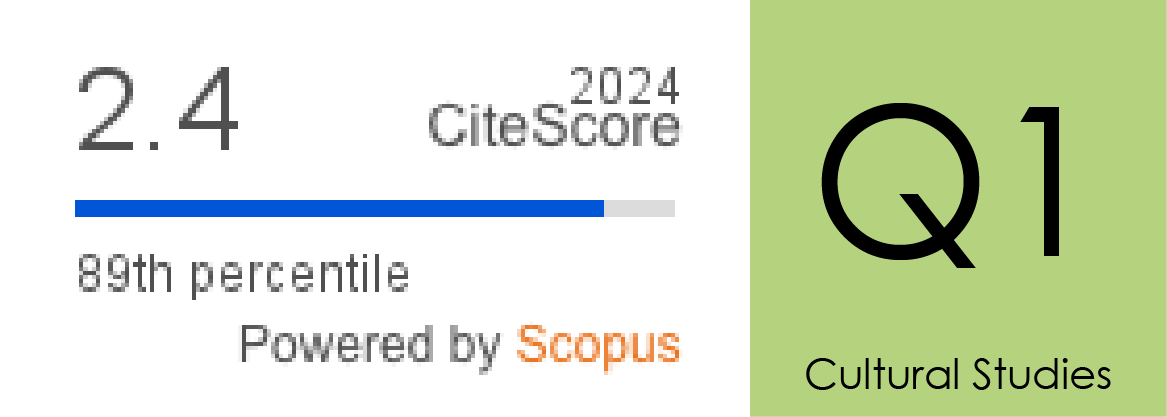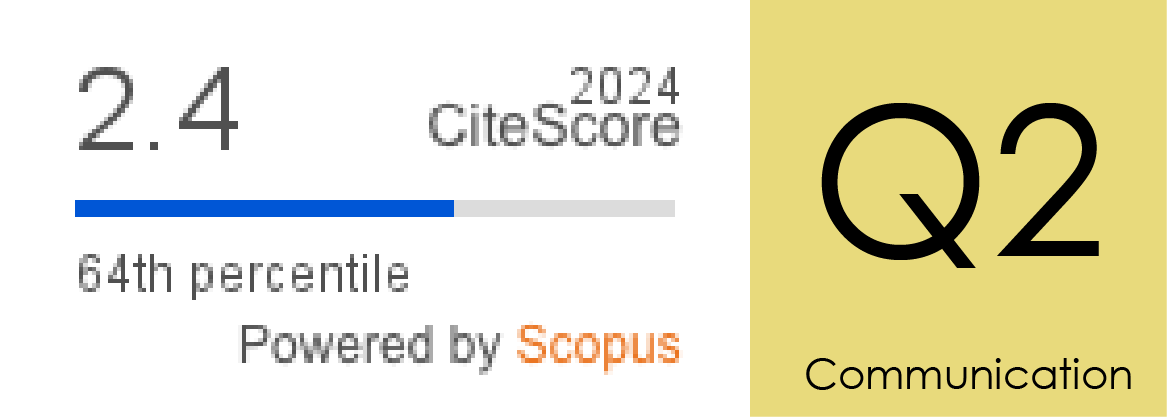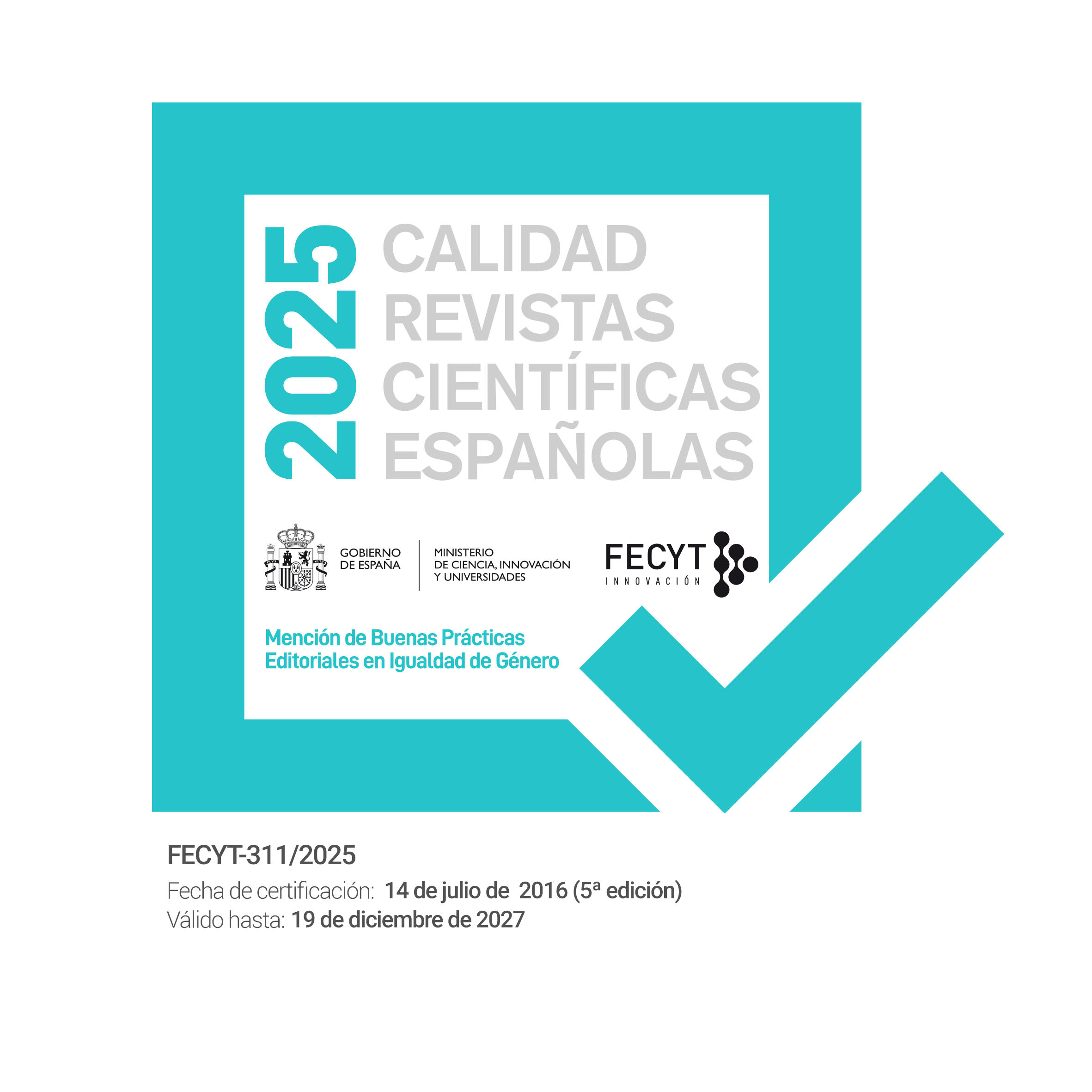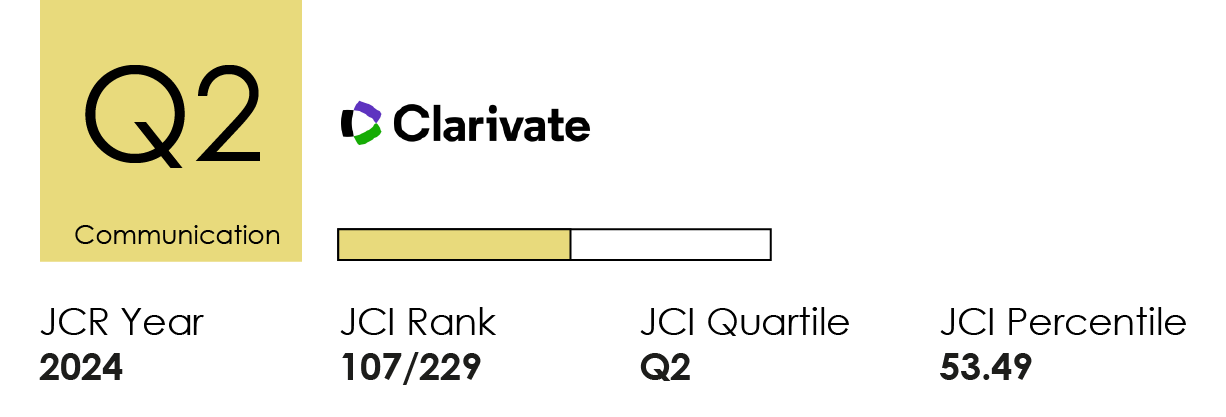Retos de la IA en la era del streaming musical: un análisis desde la perspectiva de las personas creadoras
DOI:
https://doi.org/10.14198/MEDCOM.26929Palabras clave:
Inteligencia Artificial, plataformas de streaming, compositores, intérpretes, artistas, ejecutantes, músicos de sesiónResumen
Este artículo aborda los retos que supone la Inteligencia Artificial (IA) en la industria musical desde la perspectiva de la sostenibilidad de los modelos de negocio que gestionan la creación de valor en la industria y su relación con la percepción de los compositores/letristas y los artistas intérpretes o ejecutantes, entendidos como actores clave en el proceso de creación de valor. Para se ha planteado una encuesta semiestructurada a una muestra internacional cualitativamente representativa de creadores e intérpretes, tanto profesionales como amateurs. Como principales resultados, el artículo concluye, en primer lugar, que la IA viene a intensificar algunas de las problemáticas puestas de manifiesto en la consolidación del modelo de las plataformas de streaming, en particular respecto a sus dos grandes desafíos de sostenibilidad (el desplazamiento del valor de la creación a la tecnología y la homogeneidad creciente de su inventario, con implicaciones para la diversidad cultural y la creatividad). También pone de manifiesto que la IA generativa parece tener un impacto especialmente relevante en las fases de creación y consumo, afectando a los ámbitos y posibilidades de creación de valor de los músicos, compositores e intérpretes y de las experiencias de uso y consumo de música. La perspectiva de las personas creadoras ofrece una visión que conjuga incertidumbre y pesimismo, caracterizando las innovaciones tecnológicas como acelerantes de las disfunciones del modelo de las plataformas de streaming y resultando en la eventual devaluación de la profesión artística y de la propia creatividad y la diversidad cultural. La regulación de los marcos de aplicación de la IA en este contexto y el establecimiento de un marco que facilite la capacidad de elección por parte de los usuarios entre “creatividad artificial” y “creatividad natural” por parte de la son planteadas como vías de solución parciales.Financiación
Este monográfico forma parte del proyecto I+D+I Ecosistemas de innovación en las industrias de la comunicación: Actores, tecnologías y configuraciones para la generación de innovación en contenido y comunicación (INNOVACOM), con referencia PID2020-114007RB-I00 financiado por el Ministerio de Ciencia, Innovación y Universidades AEI/10.13039/501100011033Citas
Anantrasirichai, N., & Bull, D. (2022). Artificial intelligence in the creative industries: a review. Artificial Intelligence Review, 55, 589–656. https://doi.org/10.1007/s10462-021-10039-7
Antal, D., Fletcher, A., & Ormosi, P. L. (2021). Music Streaming: Is It a Level Playing Field? Competition Policy International. https://shre.ink/8tEw
Arditi, D. (2019). Music Everywhere: Setting a Digital Music Trap. Critical Sociology, 45(4-5). https://doi.org/10.1177/0896920517729192
Arenal, A., Armuña, C., Ramos, S., Feijoo, C., & Aguado, J.-M. (2022). Giants with feet of clay: the sustainability of the business models in music streaming services. El Profesional de la Información, 31(5). https://doi.org/10.3145/epi.2022.sep.09
Aswad, J. (2023). Warner Music Joins Deezer’s New ‘Artist-Centric’ Royalty Model. Variety. https://shre.ink/8xUP
Avdeeff, M. (2019). Artificial Intelligence & Popular Music: SKYGGE, Flow Machines, and the Audio Uncanny Valley. Arts, 8(4). https://doi.org/10.3390/arts8040130
Beaumont-Thomas, B. (2021). Rolling Stones, Tom Jones and more join campaign for law change on streaming. The Guardian. https://shre.ink/8tJP
Bilan, Y., Pimonenko, T., & Starchenko, L. (2020). Sustainable business models for innovation and success: bibliometric analysis. Paper Presented at the E3S Web of Conferences, 159, 04037. https://doi.org/10.1051/e3sconf/202015904037
Born, G., Morris, J., Diaz, F., & Anderson, A. (2021). Artificial intelligence, music recommedation, and the curation of culture. University of Toronto. https://shre.ink/8tNg
Brøvig-Hanssen, R., & Jones, E. (2021). Remix’s retreat? Content moderation, copyright law and mashup music. New Media & Society, 25(6). https://doi.org/10.1177/14614448211026059
Bruns, A. (2013). From prosumption to produsage. In, Handbook on the Digital Creative Economy (pp. 67–78). Edward Elgar Publishing.
Butler, S. (2021). Inside the global digital music market. WIPO. https://shre.ink/8ts4
Carman, A. (2024). Spotify’s Editorial Playlists Are Losing Influence Amid AI Expansion. Bloomberg. https://shre.ink/8tNk
Castle, C., & Feijoo, C. (2021). Study on the artists in the digital music marketplace: economic and legal considerations. WIPO. https://shre.ink/8tsX
Castro-Martínez, E., Recasens, A., & Jiménez-Sáez, F. (2013). Innovation systems in motion: an early music case. Management Decision, 51(6), 1276–1292. https://doi.org/10.1108/MD-11-2011-0433
Centre National de la Musique. (2021). Le CNM évalue l’impact d’un changement éventuel de mode de rémunération par les plateformes de streaming. Centre National de la Musique. https://shre.ink/8tNC
Cohen, L., & Reid, T. (2023). An early look at the possibilities as we experiment with AI and Music. Youtube Official Blog. https://n9.cl/cr5dx
Cook, C. (2023). Generative AI being used to create fake pre-release ‘pirate’ tracks, says UMG content protection boss. Complete MusicUpdate. https://shre.ink/8tRS
Cook, C. (2024). New York Times journalist slams OpenAI as “no different than any other thief” in latest copyright lawsuit. Complete MusicUpdate. https://shre.ink/8tRp
Cooke, C., & Taylor, S. (2024). Artificial Intelligence and the music industry in 2023. Complete MusicUpdate. https://shre.ink/8tRQ
Council of Music Makers. (2024). A message from music-makers to employees at the major music companies. Council Of Music Makers. https://shre.ink/8tpo
Cranz, A. (2023). The new WGA contract will change how Hollywood works. The Verge. https://shre.ink/8tdF
Dalugdug, M. (2023). Amazon Music strikes playlist partnership with generative AI music company Endel. MusicBuiness Worldwide. https://shre.ink/8xUx
Dalugdug, M. (2024). Stability AI’s Former VP of Audio Launches Certification For AI Models that Respect Copyrights. MusicBuiness Worldwide. https://shre.ink/8x1J
Darvish, M., & Bick, M. (2023). The Role of Digital Technologies in the Music Industry—A Qualitative Trend Analysis. Information Systems Management, 41(2)181−200. https://doi.org/10.1080/10580530.2023.2225129
David, E. (2023). YouTube is figuring out its AI strategy by working with music labels. The Verge. https://shre.ink/8tBI
Díaz Sarmiendo, C., López Lambraó, M., & Roncallo Lafont, L. (2017). Entendiendo las generaciones: una revisión del concepto, clasificación y características distintivas de los baby boomers, X y millennials. Clío América, 11(22), 188–204. http://10.21676/23897848.2440
Digital, Culture, Media and Sport Committee. (2021). Economics of music streaming Second Report of Session 2021–22. House of Commons. https://shre.ink/8tVs
Digital, Culture, Media and Sport Committee. (2023). Culture Secretary and creative industries to discuss AI. GOV.UK. https://shre.ink/8tpF
Dredge, S. (2021). Holly Herndon launches her own ‘deepfake twin’ Holly+. Musically. https://shre.ink/8tFC
Edwards-Schachter, M., & Wallace, M. L. (2017). ‘Shaken, but not stirred’: Sixty years of defining social innovation. Technological Forecasting and Social Change, 119, 64–79. https://doi.org/https://doi.org/10.1016/j.techfore.2017.03.012
European Composer & Songwriter Alliance. (2023). ECSA’s vision on music streaming: music streaming and its impact on music authors. European Composer & Songwriter Alliance. https://shre.ink/8tJV
European Grouping of Societies of Authors and Composers. (2023). GESAC’s 10 Points for a more sustainable and author friendly music streaming market at EU level. https://shre.ink/8tsK
Federación Internacional de Músicos. (2018). Streaming: distribución a prorrata o centrada en el usuario. https://shre.ink/8tJi
Federal Trade Commission. (2023). Generative Artificial Intelligence and the Creative Economy Staff Report: Perspectives and Takeaways. https://shre.ink/8tpr
Forde, E. (2023). AI of the storm: Artificial Intelligence and the music industry in 2023. Synchtank. https://shre.ink/8xmA
Galloy, P., & Samain, M. (2023). Les géants du web attaquent la loi belge sur le droit d’auteur. L’Echo. https://shre.ink/8tVl
Gillespie, T. (2018). Custodians of the Internet: Platforms, Content Moderation, and the Hidden Decisions That Shape Social Media. Yale University Press.
Godin, B., & Gaglio, G. (2019). How does innovation sustain ‘sustainable innovation’’. In, Handbook of Sustainable Innovation, (pp.27-37). Edward Elgar Publishing.
González Pascual, M. (2024). El activista que acorrala a la inteligencia artificial en los juzgados: “Es la lucha de nuestras vidas”. El País. https://shre.ink/8tdA
Google Arts & Culture. (2020). 12 songs created by IA. https://shre.ink/8t0y
Graeme, G. (2023). Artificial Intelligence in the music industry: its use by pirate and right holders. In, Advisory Committee on Enforcement, (pp.15−22). World Intellectual Property Organization. https://shre.ink/8tV0
Grein, P. (2024). A Brief History of Genre at the Grammys. Billboard. https://shre.ink/8twC
Habuka, H. (2023). Japan’s Approach to AI Regulation and Its Impact on the 2023 G7 Presidency. CSIS Center for Strategic and International Studies. https://shre.ink/8tze
Hesmondhalgh, D. (2021). Is music streaming bad for musicians? Problems of evidence and argument. New Media and Society, 23(12), 3593-3615. https://doi.org/10.1177/1461444820953541
Hissong, S. (2021). Apple Music Pays $0.01 Per Stream. Rolling Stone. https://shre.ink/8tJu
Hunter-Tilney, L. (2023). AI in the music industry. Finantial Times. https://shre.ink/8t0W
IFPI. (2023). Global Music Report 2023. https://shre.ink/8tEn
Klein, D. (2023). Spotify anuncia que finalmente se queda en Uruguay. CNN En Español. https://shre.ink/8tV1
LeGardon, A. (2023). Sobre LeGardon.net. LeGardon.Net. https://shre.ink/8xmm
Leight, E. (2023a). Could a Link to Organized Crime Spark a Crackdown on Streaming Fraud? Billboard. https://shre.ink/8tsr
Leight, E. (2023b). Sped-Up Remixes Ruled TikTok in 2023. Y!Entertainment. https://shre.ink/8ts2
Leight, E. (2023c). Streaming Fraud 101: 3 Common Techniques Used By Scammers. Billboard. https://shre.ink/8tBO
Marcus, G., & Southen, R. (2024). Generative AI Has a Visual Plagiarism Problem. IEEE Spectrum. https://shre.ink/8tdD
Martín Barbero, I. (2023). Spotify se pone seria: elimina miles de canciones creadas. Cinco Días. https://shre.ink/8xUz
Mayfield, G., & Aswad, J. (2023). AI vs. the Music Industry: With the Internet Full of Fake Drakes and Eminems, Who Gets Paid? Variety. https://shre.ink/8tWw
Meyn, J., Kandziora, M., Albers, S., & Clement, M. (2023). Consequences of platforms’ remuneration models for digital content: initial evidence and a research agenda for streaming services. Journal of the Academy of Marketing Science, 51(1), 114–131. https://doi.org/10.1007/s11747-022-00875-6
Miles, M., & Huberman, A. (1994). Qualitative Data Analysis: an expanded sourcebook. SAGE Publications.
Mohan, N. (2023). Our principles for partnering with the music industry on AI technology. Youtube Official Blog. https://n9.cl/3orjsy
Morris, J. W. (2020). Music Platforms and the Optimization of Culture. Social Media+Society, 6(3). https://doi.org/10.1177/2056305120940690
Mullin, B. (2023). Inside the News Industry’s Uneasy Negotiations With OpenAI. The New York Times. https://shre.ink/8tRH
Music Buiness Worldwide. (2024). Mark Douglas on AI: 'We need our legislators to spend less time worrying about killer robots of the future and really focus on the harms that have already taken place". MusicBuiness Worldwide. https://shre.ink/8tzP
National Music Publishers’ Association. (2023). Generative AI is ’the greatest risk to the human creativen class that has ever existed. https://shre.ink/8tWb
Nicolaou, A. (2023). Universal Music sues Anthropic over AI-generated lyrics. Financial Times. https://shre.ink/8tRL
Noor, K. B. M. (2008). Case Study: A Strategic Research Methodology. American Journal of Applied Sciences, 5, 1602–1604. https://doi.org/10.3844/ajassp.2008.1602.1604
Pel, B., Haxeltine, A., Avelino, F., Dumitru, A., Kemp, R., Bauler, T., Kunze, I., Dorland, J., Wittmayer, J., & Jørgensen, M. S. (2020). Towards a theory of transformative social innovation: A relational framework and 12 propositions. Research Policy, 49(8), 104080. https://doi.org/https://doi.org/10.1016/j.respol.2020.104080
Pirate Staff (2023). Over half of musicians will conceal AI use. Pirate.com. https://shre.ink/8tp1
Raygoza, I. (2023). Bad Bunny critica canciones que lo imitan con IA que se hacen virales en TikTok. Billboard. https://shre.ink/8tV3
Renard, O. & Milt, K. (2023). Cultural diversity and the conditions for authors in the European music streaming market: a bibliographical review.
Richter, F. (2023). Charted: The impact of streaming on the music industry. World Economic Forum.
Robinson, K. (2024). House Lawmakers Unveil No AI FRAUD Act in Push for Federal Protections for Voice, Likeness. Billboard. https://shre.ink/8tzI
Romo, V. (2023). Grimes invites fans to make songs with an AI-generated version of her voice. NPR. https://shre.ink/8tWZ
Rose, M. (2023). Streaming in the Dark: Competitive Dysfunction within the Music Streaming Ecosystem (preprint). Berkeley Journal of Entertainment & Sports Law. https://shre.ink/8tdO
Rutherford, N. (2023). Drake and The Weeknd AI song pulled from Spotify and Apple. BBC. https://shre.ink/8tpP
Sato, M., & Lawler, R. (2023). What’s really going on with ‘Ghostwriter’ and the AI Drake song? The Verge. https://shre.ink/8tFQ
Sawyer, N. (2023). Will AI kill music making, or could it save creatives? Reader’s Digest. https://shre.ink/8tdp
Schaltegger, S., Hansen, E. G., & Lüdeke-Freund, F. (2015). Business Models for Sustainability: Origins, Present Research, and Future Avenues. Organization & Environment, 29(1), 3–10. https://doi.org/10.1177/1086026615599806
Shakeel, J., Mardani, A., Chofreh, A. G., Goni, F. A., & Klemeš, J. J. (2020). Anatomy of sustainable business model innovation. Journal of Cleaner Production, 261, 121201. https://doi.org/https://doi.org/10.1016/j.jclepro.2020.121201
Silberling, A. (2024). The creator economy is ready for a workers’ movement. Techcrunch. https://shre.ink/8xma
Soriano, R. (2023). Bad Bunny carga contra una canción creada con IA: “Si les gusta esa mierda, no merecen ser mis amigos”. El País. https://shre.ink/8tEc
Sparrow, J. (2023). Music AI in 2023: a database. Musically. https://shre.ink/8t0G
Spotify for Artists. (2023). Track monetization eligibility. https://shre.ink/8x1p
Spotify for Artists. (2023). Modernizing Our Royalty System to Drive an Additional $1 Billion toward Emerging and Professional Artists. https://shre.ink/8xmt
Stassen, M. (2023a). Sony Music has issued nearly 10.000 deepfake takedowns... and other things we learned from Dennis Kooker’s Speech about AI. MusicBuiness Worldwide. https://shre.ink/8tBF
Stassen, M. (2023b). Streaming fraud accounts for at least 1-3% of plays on services like Spotify and Deezer in France, shows investigation. MusicBuiness Worldwide. https://shre.ink/8tBy
Stassen, M. (2023c). Thre are now 120,000 new tracks hitting music streaming services each day. MusicBuiness Worldwide. https://shre.ink/8tBX
Stassen, M. (2024). Global on-demand audio streams reached 4 trillion mark for the first time ever in a single year in 2023. MusicBuiness Worldwide. https://shre.ink/8tN0
Tencer, D. (2024a). Andressen Horowitz’s thoughts on AI shows what the music industry will be up against 2024. Music Buiness Worldwide. https://shre.ink/8tWG
Tencer, D. (2024b). The EU’s AI act is a vital piece of legislation for the music industry -- but what does it actually say? MusicBuiness Worldwide. https://shre.ink/8tzn
Thakrar, K. (2023). A new era of ‘fan-made’ music is about to begin. MIDiA Research. https://shre.ink/8tEf
The Ivors Academy of Music Creators. (2021). Fix Streaming. https://shre.ink/8tJz
UK Intellectual Property Office. (2023). United Kingdom Industry Agreement on Music Streaming Metadata. GOV.UK. https://shre.ink/8ts7
Ulvaeus, B. (2023). Discurso de Björn Ulvaeus en la Asamblea General de la CISAC 2023. CISAC. https://shre.ink/8tph
UNESCO. (2023). Revenue distribution and transformation in the music streaming value chain. CISAC. https://shre.ink/8tpK
Universal Music Group. (2023a). Universal Music Group and Deezer to launch de first comprehensive artist-centric music streaming model. https://shre.ink/8x1T
Universal Music Group. (2023b). Endel and Universal Music group to create AI-powered, artist-driven functional music, designed to support listerner wellness. https://shre.ink/8x1a
Universal Music Group. (2023c). Universal Music Group and Bandlab technologies announce first-of-its kind strategic AI collaboration. https://shre.ink/8x1H
van Wijk, J., Zietsma, C., Dorado, S., de Bakker, F. G. A., & Martí, I. (2018). Social Innovation: Integrating Micro, Meso, and Macro Level Insights From Institutional Theory. Business & Society, 58(5), 887–918. https://doi.org/10.1177/0007650318789104
Walfisz, J. (2023). Spotify launches AI tool for translating podcasts. Euronews. https://shre.ink/8xU0
Walshe, J. (2023). Unsound Dispatch: 13 Ways of Looking at AI, Art & Music. Unsound. https://shre.ink/8tV5
Warner Music Group. (2023). Boomy partners with ADA worldwide on global distribution deal. Warner Music Group. https://shre.ink/8tVP
Wes, D. (2023). AI companies have all kinds of arguments against paying for copyrighted content. The Verge. https://shre.ink/8tzi
World Intellectual Property Organization. (1996). WIPO Performances and Phonograms Treaty. https://shre.ink/8xUW
Yang, M. (2022). ‘Menace to public health’: 270 experts criticise Spotify over Joe Rogan’s podcast. The Guardian. https://shre.ink/8tB5
Yoo, N., & Monroe, J. (2021). Spotify Launches “Loud & Clear” Transparency Initiative. Pitchfork. https://shre.ink/8t0E
Descargas
Estadísticas
Publicado
Cómo citar
Número
Sección
Licencia
Derechos de autor 2024 Alberto Arenal, Cristina Armuña, Juan-Miguel Aguado-Terrón, Sergio Ramos, Claudio Feijóo

Esta obra está bajo una licencia internacional Creative Commons Atribución 4.0.
Los autores y autoras que publican en esta revista están de acuerdo con los siguientes términos:
1 Derechos de autor. Los autores y autoras conservan sus derechos de autor, aunque ceden a la revista de forma no exclusiva los derechos de explotación (reproducción, distribución, comunicación pública y transformación) y garantizan a esta el derecho de primera publicación de su trabajo, el cual estará simultáneamente sujeto a la licencia indicada en punto 2. Los autores pueden establecer otros acuerdos adicionales para la distribución no exclusiva de la versión de la obra publicada en la revista, siempre que exista un reconocimiento de su publicación inicial en esta revista.
© Los autores.
2 Licencia. Los trabajos se publican en la revista sujetos a la licencia de Reconocimiento 4.0 Internacional de Creative Commons (CC BY 4.0); los términos se pueden consultar en https://creativecommons.org/licenses/by/4.0/
Esta licencia permite a terceros compartir (copiar y redistribuir el material en cualquier medio o formato) y adaptar (remezclar, transformar y crear a partir del material para cualquier finalidad, incluso comercial), siempre que se reconozca la autoría y la primera publicación en esta revista (Revista Mediterránea de Comunicación (RMC) / Mediterranean Journal of Communication (MJC), Universidad de Alicante, DOI de la obra), se proporcione un enlace a la licencia y se indique si se han realizado cambios en la obra.
3 Política de autoarchivo. Se recomienda a los autores que difundan sus trabajos a través de Internet para favorecer una circulación y difusión más rápidas y, con ello, un posible aumento en la citación y alcance entre la comunidad científica y académica, en las siguientes condiciones:
No se permite a los autores depositar en un repositorio institucional o temático, página web propia, etc., las versiones preprint (versión antes de ser evaluada) o postprint (versión evaluada y aceptada para su publicación) de sus trabajos antes de su publicación, pero sí el artículo final publicado (versión del editor).














